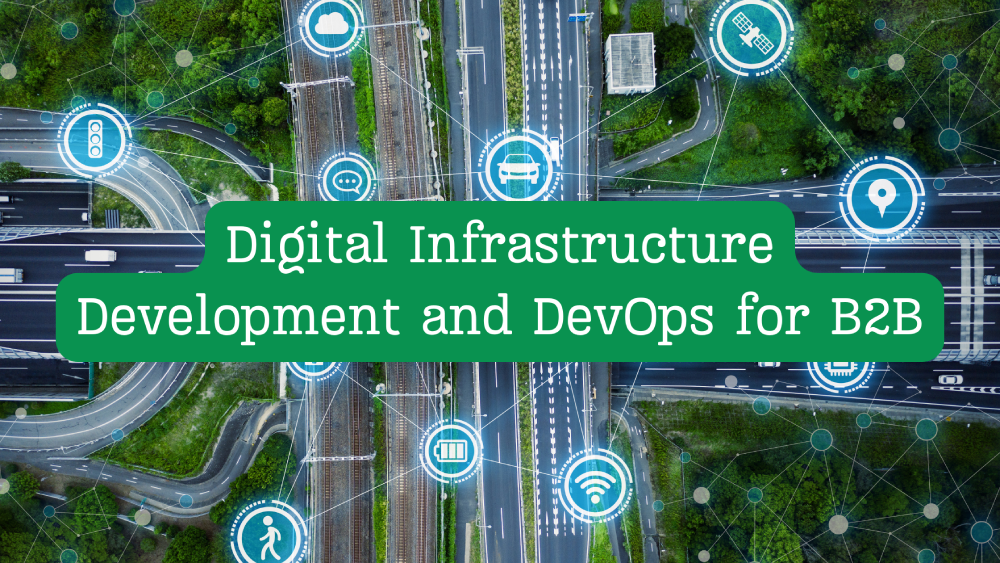
As more companies undergo digital transformations, the need for robust digital infrastructure and DevOps services has grown exponentially. For tech companies that cater to B2B (business-to-business) clients, offering digital infrastructure development and DevOps services requires careful planning, technical precision, and a deep understanding of the client’s unique needs.
Here, we will explore the intricacies of digital infrastructure development and DevOps, focusing on how tech companies can plan, execute, and deliver these services effectively to meet the evolving demands of B2B clients.
A Word on Digital Infrastructure Development
What is Digital Infrastructure?
Digital infrastructure encompasses all the technical systems, services, and networks that enable modern digital applications to function seamlessly. This includes physical components such as data centers, servers, networking hardware, and storage systems, as well as virtualized resources like cloud platforms and software-defined networking (SDN). Digital infrastructure is the backbone of any organization’s IT ecosystem, powering everything from basic networking to complex applications and services.
Significance of a Solid Digital Infrastructure
For businesses to thrive in a digital-first world, a solid and scalable infrastructure is paramount. It not only supports day-to-day operations but also enables innovation, data-driven decision-making, and enhanced customer experiences. A well-planned digital infrastructure should provide:
- Scalability: The ability to grow and adapt as the company expands or changes.
- Reliability: Minimal downtime and high availability to ensure continuous operations.
- Security: Protection against cyber threats and data breaches.
- Performance: High-speed connectivity and optimized performance for applications.
Tech companies must ensure their digital infrastructure development services can meet these critical demands. This involves designing systems that are flexible, resilient, and aligned with emerging technologies.
Emerging Trends in Digital Infrastructure Development
To stay competitive, tech companies need to be at the forefront of the latest trends in digital infrastructure. These trends are shaping how infrastructure is designed and deployed for B2B clients:
- Edge Computing: Processing data closer to its source improves response times and saves bandwidth. This is particularly important for industries that need real-time data processing, such as IoT (Internet of Things) and autonomous vehicles.
- Hybrid Cloud Solutions: While cloud computing remains essential, many businesses opt for a hybrid model that combines public cloud, private cloud, and on-premises resources. This offers greater flexibility and control over sensitive data.
- Network Function Virtualization (NFV): By virtualizing networking functions that traditionally required dedicated hardware, businesses can reduce costs and improve network flexibility.
- Automation: Automated infrastructure management tools allow for faster deployment, configuration, and maintenance of systems, reducing manual intervention and human error.
By keeping pace with these trends, tech companies can better plan and deliver digital infrastructure solutions that are future-proof and cater to the growing demands of B2B clients.
Good to Know: Only a few tech companies offer both digital infrastructure and DevOps as a service to B2B clients. And those that do have an upper-hand in making themselves standout.
Introduction to DevOps
DevOps Explained
DevOps is a set of practices and tools that combine software development (Dev) and IT operations (Ops) to streamline the delivery of applications and services. The goal of DevOps is to shorten the software development lifecycle while delivering high-quality software that meets client needs. Key components of a DevOps pipeline include:
- Continuous Integration (CI): Developers regularly merge code changes into a shared repository, where automated tests and builds are triggered.
- Continuous Deployment (CD): Once code passes testing, it is automatically deployed to production environments.
- Infrastructure as Code (IaC): Infrastructure provisioning and management are automated using code, improving consistency and reducing manual errors.
- Monitoring and Logging: Comprehensive monitoring systems provide real-time insights into application performance and health, enabling faster response to issues.
Why DevOps Matter for Modern Businesses
For B2B clients, the ability to quickly deliver new features, address bugs, and ensure the stability of their digital products is critical to staying competitive. DevOps offers several key benefits that make it indispensable for digital infrastructure:
- Speed: Faster software development and deployment cycles allow businesses to adapt quickly to market changes and customer demands.
- Reliability: Continuous monitoring and automated testing reduce the risk of errors and downtime in production environments.
- Collaboration: DevOps breaks down silos between development, operations, and other teams, fostering better communication and collaboration.
- Security: By incorporating security checks throughout the development process (DevSecOps), companies can catch and fix vulnerabilities earlier, reducing security risks.
Tech companies offering DevOps services to B2B clients must ensure that their solutions align with these benefits and address the client’s specific operational challenges.
Key Considerations for Tech Companies Offering B2B Digital Infrastructure and DevOps Services
To successfully plan and offer digital infrastructure development and DevOps services to B2B clients, tech companies must take a holistic approach. Below are some key considerations for effectively serving business clients:
1. Client-Centric Approach
Understanding the specific needs of each B2B client is essential. Every business has unique operational challenges, regulatory requirements, and performance expectations. Therefore, a one-size-fits-all solution rarely works in B2B environments. Tech companies should engage with clients early in the planning phase to assess:
- Current Infrastructure: What does the client already have in place? Is it a legacy system or a modern, cloud-based setup?
- Business Goals: What are the client’s short- and long-term business objectives? How can the digital infrastructure and DevOps solutions support these goals?
- Compliance and Security: Does the client operate in a heavily regulated industry, such as healthcare or finance, where compliance and data protection are paramount?
By taking a client-centric approach, tech companies can tailor their solutions to better meet the specific needs of each business.
2. Automation and Efficiency
Automation is a cornerstone of both digital infrastructure and DevOps. When building or managing infrastructure, leveraging automation tools for provisioning, monitoring, and scaling can save clients both time and money. Similarly, automating the DevOps pipeline with CI/CD tools, automated testing, and IaC can significantly improve efficiency and reduce manual overhead.
Key areas where automation can provide value include:
- Infrastructure Automation: Tools like Ansible, Terraform, and Puppet allow for automated provisioning and configuration of infrastructure components.
- CI/CD Pipelines: Jenkins, GitLab CI, and CircleCI are popular tools for building and deploying software applications automatically.
- Containerization and Orchestration: Using container orchestration platforms like Kubernetes to manage microservices architecture allows for better scalability and fault tolerance.
Tech companies must emphasize automation to help B2B clients achieve faster time-to-market and reduce operational costs.
3. Security-First Design
B2B clients are particularly sensitive to security concerns, especially in industries where data breaches can lead to significant financial and reputational damage. Therefore, security should be integrated into both digital infrastructure development and DevOps workflows from the outset.
A security-first design should include:
- Encryption: Protecting data at rest and in transit using encryption techniques.
- Access Control: Implementing robust identity and access management (IAM) solutions to ensure that only authorized personnel can access sensitive systems and data.
- DevSecOps: Shifting security “left” by embedding security practices into the DevOps process. This includes running automated security scans and code analysis as part of the CI pipeline.
- Compliance Auditing: Regularly auditing the infrastructure to ensure compliance with industry regulations (e.g., GDPR, HIPAA).
Tech companies must prioritize security when designing and offering these services to build trust with their clients.
4. Cloud-Native Solutions
As more businesses migrate to the cloud, tech companies must be well-versed in cloud-native solutions. Cloud platforms like Amazon Web Services (AWS), Microsoft Azure, and Google Cloud provide the infrastructure, storage, and computing power needed to scale operations globally. However, successfully managing cloud environments requires specific expertise.
When offering cloud-native infrastructure and DevOps services, tech companies should focus on:
- Cloud Strategy: Helping clients choose the right cloud model (public, private, hybrid) that aligns with their business goals.
- Microservices Architecture: Designing applications as microservices allows for easier scaling and deployment.
- Serverless Computing: Offering serverless options such as AWS Lambda or Azure Functions, which reduce infrastructure management overhead.
Tech companies need to emphasize their cloud expertise to deliver scalable, cost-effective solutions to B2B clients.
5. Ongoing Support and Monitoring
After the infrastructure is built and the DevOps pipeline is in place, ongoing support is critical for ensuring the system’s long-term success. Continuous monitoring of infrastructure and applications helps businesses quickly identify and resolve issues before they impact operations. Monitoring tools such as Prometheus, Grafana, and ELK Stack (Elasticsearch, Logstash, Kibana) offer real-time insights into system health.
Tech companies should offer B2B clients comprehensive support packages that include:
- 24/7 Monitoring: Proactive monitoring and alerting to detect issues before they escalate.
- Performance Optimization: Regular performance tuning to ensure that infrastructure and applications are running optimally.
- Incident Response: A clear incident response plan for addressing outages, security breaches, or other emergencies.
Tech companies can ensure that their clients’ digital infrastructure and DevOps systems continue to function smoothly and scale as needed.
As digital transformation accelerates across industries, the demand for digital infrastructure development and DevOps services will only continue to grow. For tech companies serving B2B clients, the key to success lies in a thorough understanding of the client’s unique requirements, a focus on automation and efficiency, and a commitment to security.
SOURCE:

